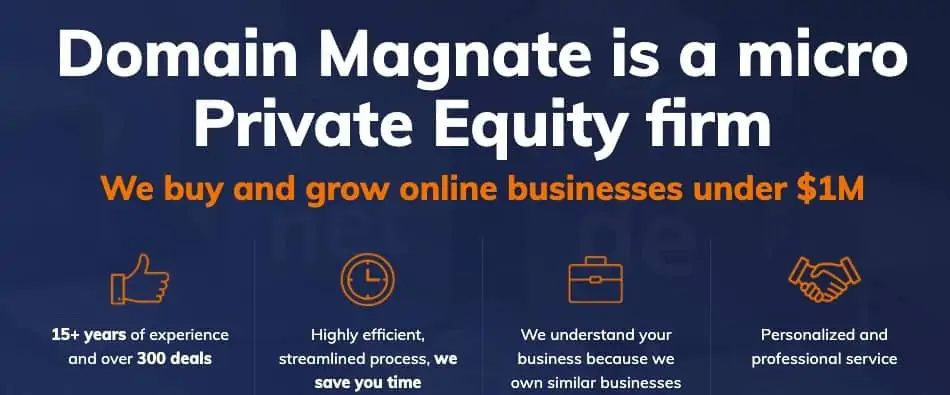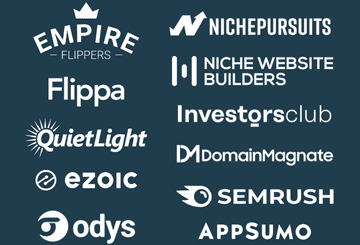As I acquire authority websites in various verticals and scale them up through their lifecycle, I am always on the lookout for top-notch website operators.
Why do I hire website operators? To free up my time so I can focus on the next investment.
An all-inclusive website operator has a deep understanding of SEO, CRO, and technical skills for running a niche content website. They understand the “levers” to be manipulated in order to increase the traffic and revenue of the business.
In this write-up, I will cover the following:
- What is a website operator? Who should hire one? When to outsource?
- Red flags with operators
- Incentive structures
- Best websites operators that fully-manage online businesses
- My strategy of hiring “Quasi”-Website Operators
Let’s get to it!
➡️ Need a Website Operator? Fill Out The Form
I have a network of operators that are looking to take on niche website operation projects. Please fill out the form below and I will make an intro to the right person.
What is a Website Operator?
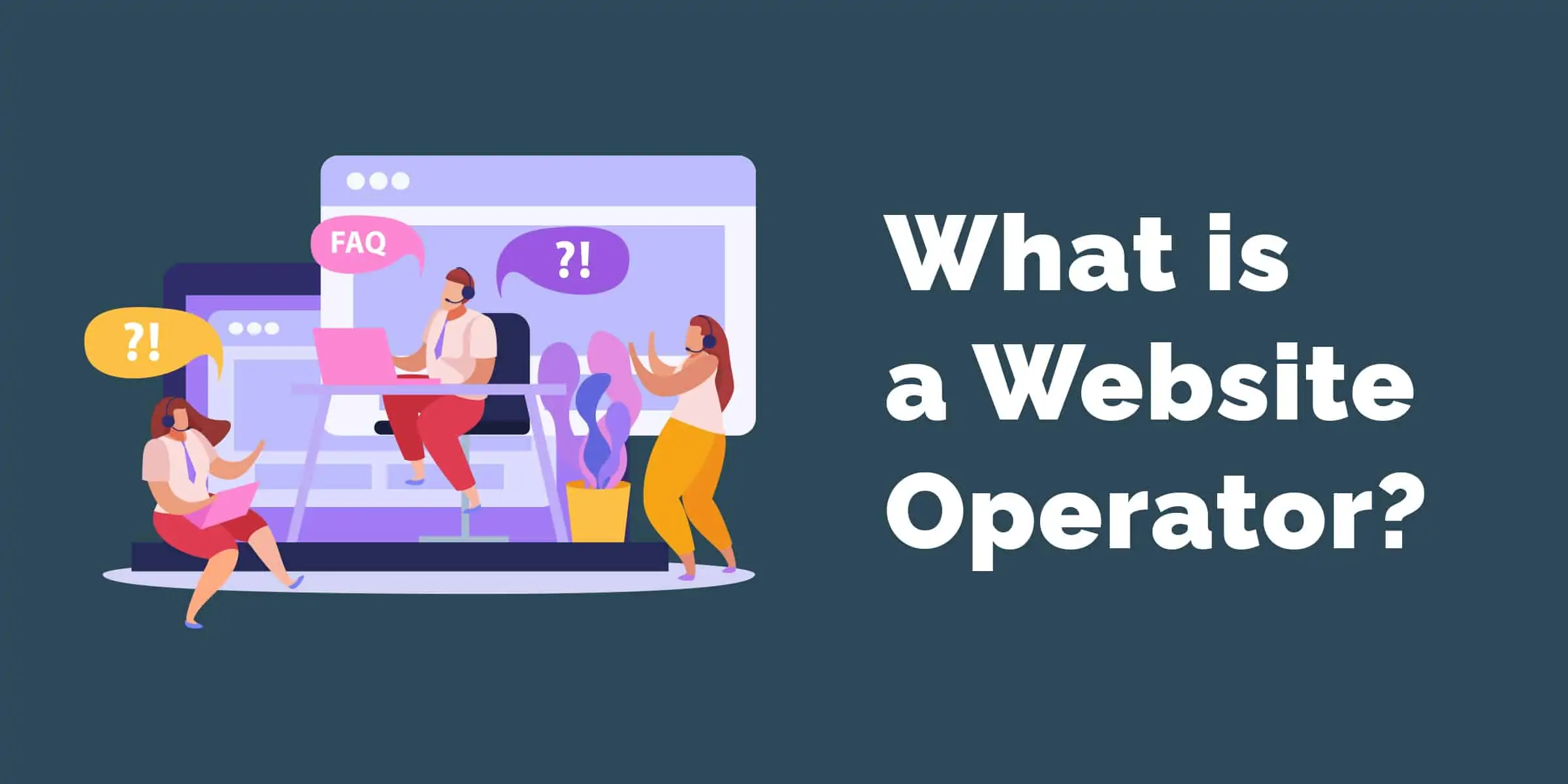
An ideal website operator is a person or a company that has a deep understanding of the “levers” they can pull on a content website to increase revenues.
A full-fledged operator should ideally be able to do all of the following:
- On-page and off-page SEO
- Conversion rate optimization (CRO)
- Revenue diversification
- Revenue negotiation
- Content planning
- Content formatting, editing, and publishing
- Writer sourcing and management
- Hosting and server maintenance (basic level)
By doing all of the above, the primary role of the website operator is to grow the traffic and revenues of the website.
Who Should Hire an Operator? 🤷♂️

In the website investment world, there are two types of investors: (1) investor-operator, and (2) hands-off investors.
Investor-Operator
An investor-operator is one that acquires a website and then self-operates it for a specific amount of time. This allows the investor to understand the ins and outs of content sites, the different “levers” available for growth, and perform the day-to-day tasks required.
Once an understanding is gained of the business, it’s much simpler to outsource to a website operator. You can either outsource the full management or break it up where you retain some day-to-day tasks.
If you know what kind of operations is required, it can be cheaper to source a website operator directly through your network, rather than using a done-for-you full-management service.
Hands-off Investors
Hands-off investors are typically those that purchase an asset and immediately hand-off to a website operator or they work with an operator from the beginning to source the deal.
These investors need to thoroughly understand their website investment criteria, the risk profile of content sites, impact of Google updates effect on a site, among other factors. If they are comfortable with these, they can then find a quality operator to help them manage their deals.
Takeaway: Hands-off investors should utilize more seasoned fully-managed website operating services as opposed to individually sourcing operators.
When to Outsource Website Operations? 🕒
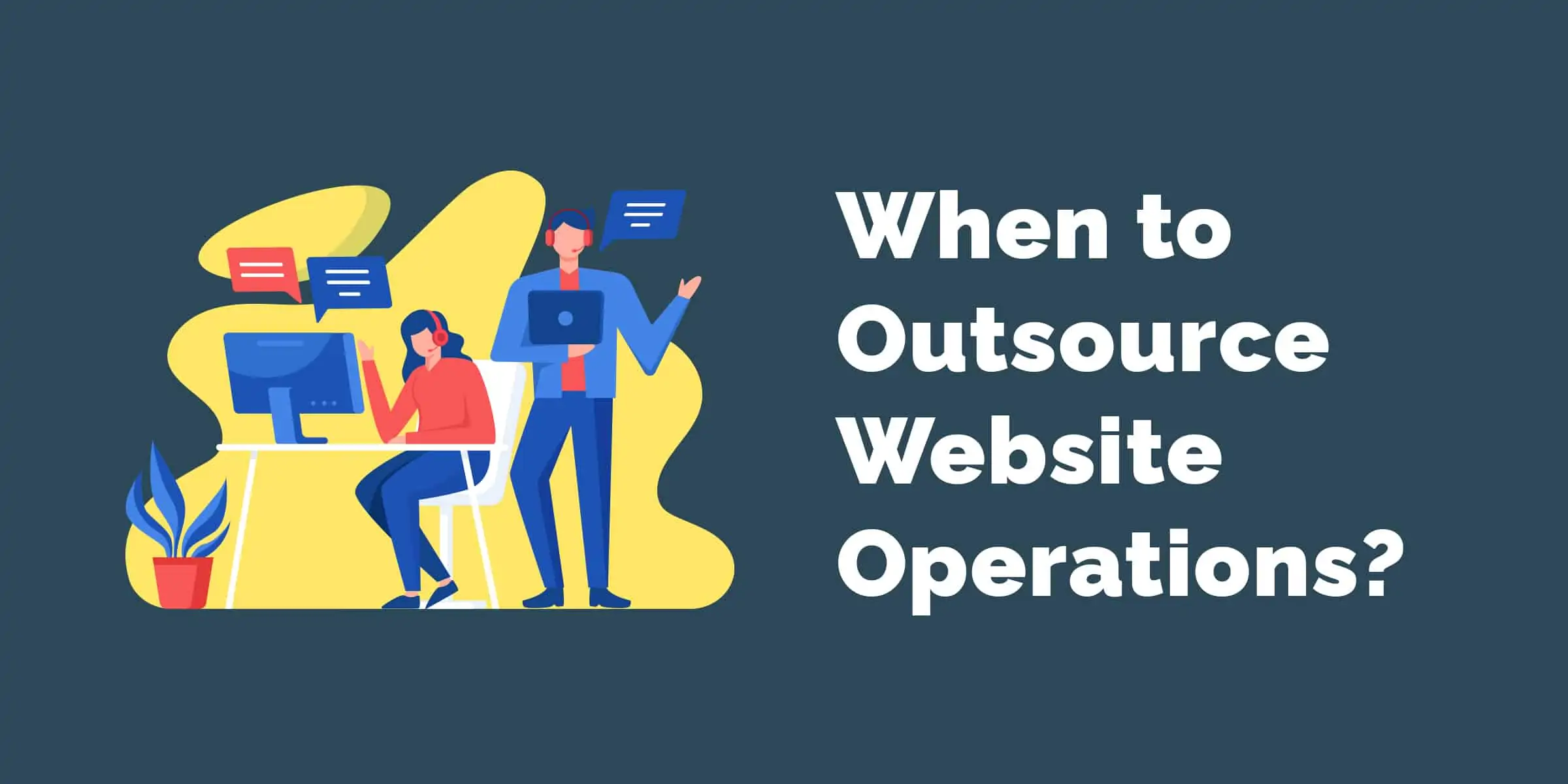
There are three things an investor should always keep in the back of their mind for each asset: (1) manage the asset themselves with virtual assistants (VA) helping, (2) sell and move on, or (3) outsource full management.
There are four specific situations when you should hire a website operator:
- Day-to-day website management is becoming less interesting
- Already ingested all of your expertise into the site
- Lack of time to continue managing
- Desire to be completely hands-off
I have seen many sites get neglected due to the investor’s focus being elsewhere which has resulted in the site’s traffic and revenue decreasing. Be proactive and hire early if this is your situation!
Takeaway: The right time to plan to outsource your asset’s operations is when you do not need to do it and both revenue/traffic are growing or stabilized.
3 Common Red Flags with Operators 🚩

I’ve come across many red flags in my years in this industry. Keep these in mind:
1. No track record
This is an obvious one: a verified track record.
Make sure to ask your operator for the following pieces of information for a few of their currently managed deals and previously managed deals/exits:
- Screenshot proof showing earnings from various sources
- Open to sharing specific sites they personally own or manage for their clients (sign an NDA if needed)
There are plenty of VAs that may claim to be website operators because they’ve “managed” sites for clients. A website operator encompasses tasks that VAs do and bring more to the table in terms of understanding content site growth strategies.
Do not intertwine a VA and an operator; they are two different things.
2. No industry references
The content investing industry is relatively small. Everyone knows everyone.
An individual or company that is providing website operational services must be able to provide industry references. This can include current clients, past clients, and/or industry experts vouching for them.
3. No public case studies
Your operator should have publicly available case studies in a blog format or PDF they can share with you.
These case studies should show raw numbers, what they did to improve the site, how long it took, and what expertise they brought to the table.
Also make sure to walk away if your operator is not willing to get on a phone/video call with you.
4 Typical Incentive Structures for Website Operators
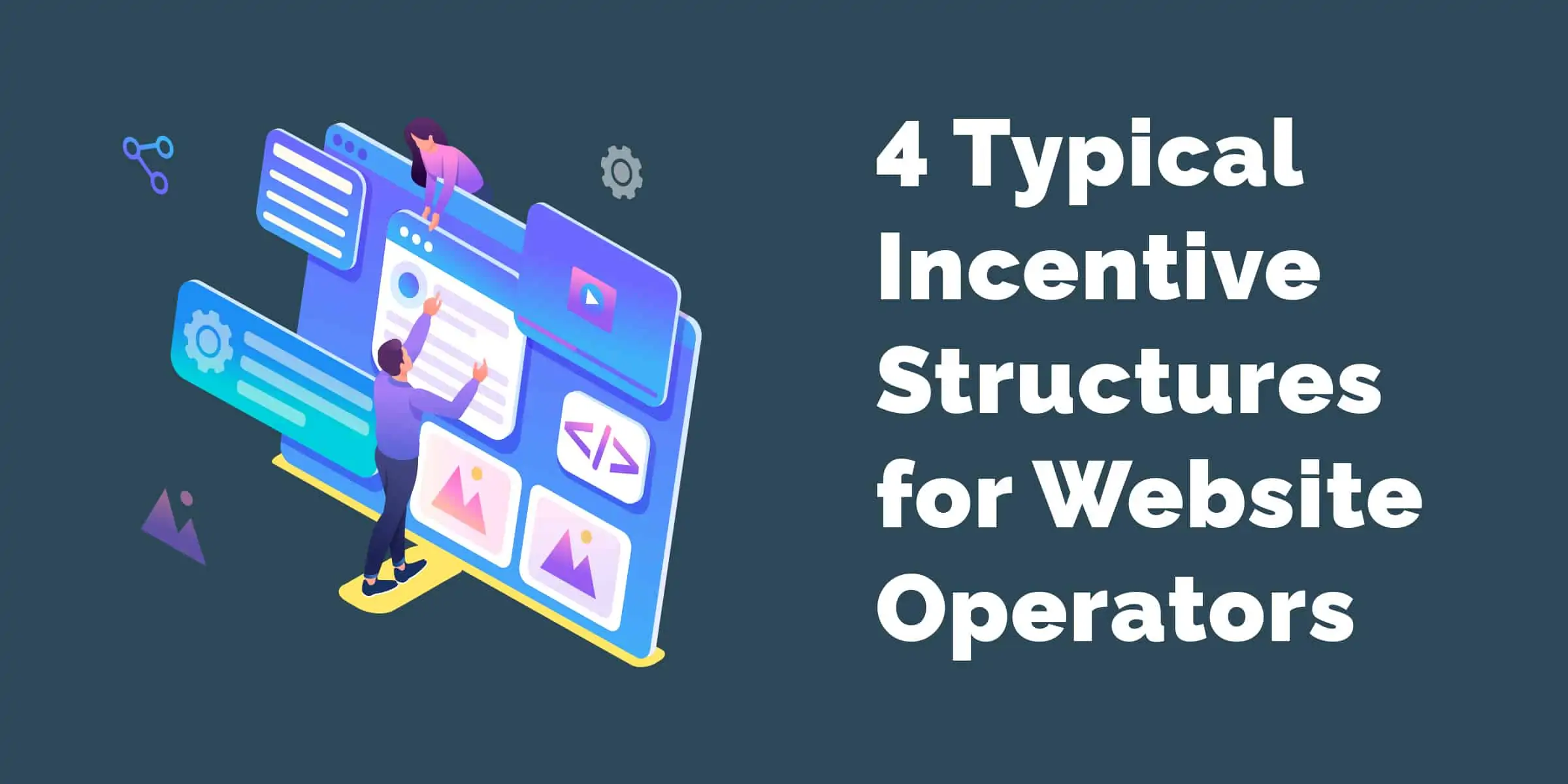
There are two main ways to compensate operators: a fixed management fee and equity. There is a multitude of ways to structure the incentives. Here are a few basic incentive structures:
1. Fixed Fee Only
Most operators may ask for a fixed fee for operating the day-to-day of the business. This fee is paid upfront and is not in respect to the revenue of the business.
2. Fixed Fee Plus Equity
Some operators may reduce their upfront fixed fee in return for growth equity. This equity is typically only paid above an average baseline of the site.
The structure is as follows:
- A baseline is determined which is usually a 6 to 12-month average revenue
- Any revenue above this baseline is paid out based on the equity share
- When selling the site, any additional profit after the investor’s initial capital is returned is given based on their equity share
3. Equity Only
With equity, the anticipation is that you share the profit, not the revenue. Website operators usually always get paid first if they only ask for a management fixed fee. With equity only, they only get paid if the business makes a profit.
Note that just because you give away equity to an operator does not mean they have “skin in the game”. They did not invest in the deal itself. They can walk away at any point from the business and forego their equity. They are not a partner.
4. “Volunteer”
This is another common one. If you are known in the industry and have a portfolio of websites, you will get people that want to volunteer their time to help you grow the site.
I tend to stay away from anything that is free labor or volunteer. I am a strong proponent that everyone should get paid no matter what. No one should work for free.
Another reason is that top-notch website operators and experts will not work for free. There is a reason for that, they know the value they bring to the table and that’s the type of expert you want working on your site.
Should you offer incentive bonuses?
Yes! You should offer bonuses to your website operator.
When discussing with an operator, set a baseline average revenue using the past 6-months of performance. If the operator beats that average by a pre-determined margin, then give him a bonus.
I structure my bonuses as milestones. Here is an example for my dating site case study:
The L6M average for the site is $8,662 per month as of the end of May 2021. If the site revenues hit $12,000/mo in any given month after starting, then a bonus payment of $1,000 will be paid.
Once this milestone is hit, we will think of the next milestone target. Note: a bonus will not be given every month the target is hit. Only once.
Best Fully-Managed Website Operators: My Recommendations
For those looking for website operators, here are my top recommendations in no particular order.
1. WebOperators.com – Headed by Mushfiq Sarker
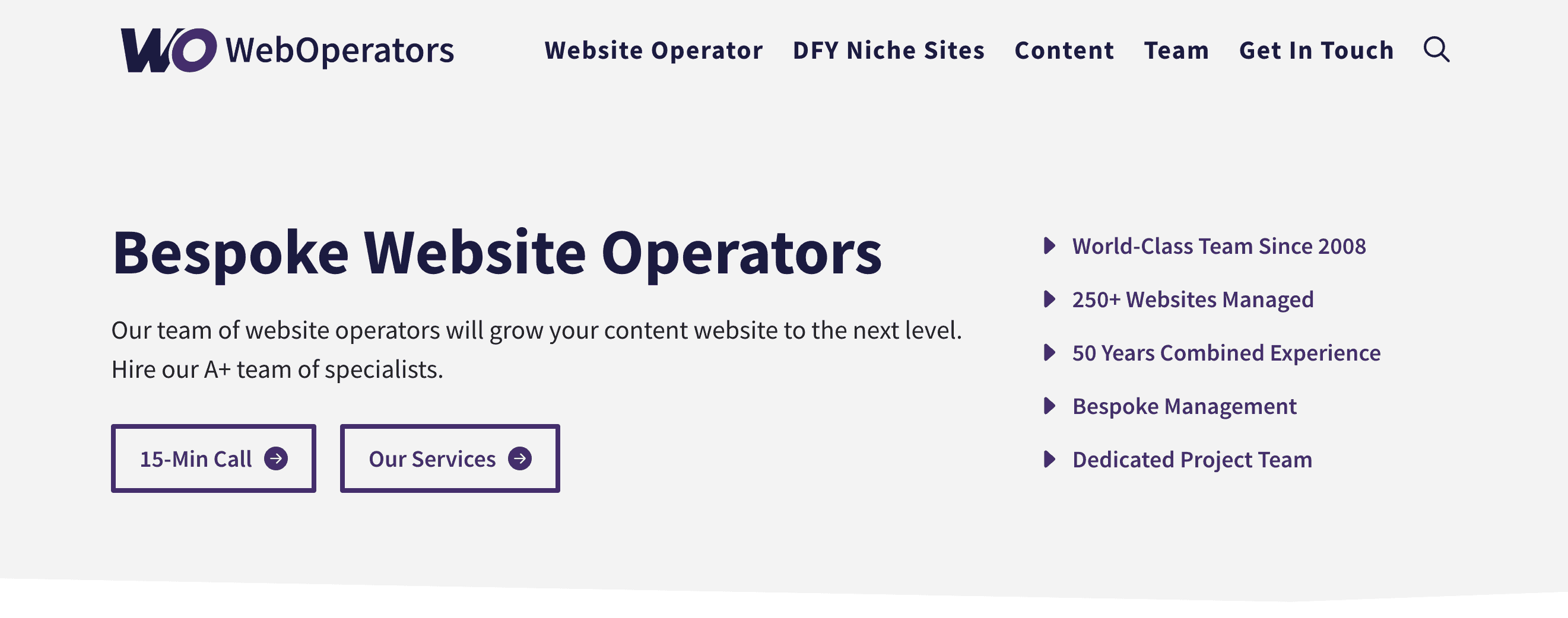
WebOperators is my brain-child agency where decades of my processes are applied to your online business. My team and I will manage and grow your website with the same standards we have done for the last 15 years with our sites.
We’ve managed and grown over 250+ websites to date. My team has 50+ years of combined experience in SEO, growth hacking, conversion rate optimization, revenue diversification, and more.
Our team consists of real practitioners. Each person has a portfolio of their own sites. They know the ins and outs of growing websites. They are not following SOPs for each site they manage. It’s a bespoke strategy unique to each website. You won’t find that anywhere.
2. BuzzLogic.com (Defunct)
Update (2023): BuzzLogic has had a change of ownership and is not headed by the same original founder. It looks like they have discontinued all operator services for now. As of Q4 2022, it’s in your best interest to find a different operator. The writing below is for informational purposes only.
BuzzLogic is an agency that manages/grows content sites for clients. Investors or entrepreneurs, it doesn’t matter. Their process has been streamlined in a way that ensures growth for the client. They are willing to adapt to the client’s goals. For example, if the client wants to improve and hold long-term, or grow and flip; they can adapt their strategy for both.
Incentive Structure
Their monthly retainers start at $2,500/mo and range up to $10,000/mo depending on the client’s goals. It’s optional that they receive equity or profit share split of any kind. If profit share is given, the monthly retainer fee would be decreased. It’s a customizable plan that is discussed with each individual investor’s goal and the site they own.
They also do SEO audits at a one-time fee $2,000.
Team Credibility
I’ve come to know of Andrej over the last few years. He is an active member of the website flipping community.
Andrej and the BuzzLogic team have been managing their own sites and investor’s sites as a team for 9 years now.
Andrej (the previous owner) has sold BuzzLogic to another company. The owners of the company are not well-known in the niche site community.
Why I Like Them
BuzzLogic is headed by a team of specialists that know what “levers” to pull to grow a site. They have access to a private brokerage so if you are wanting them to source a deal for you, they have that ability as well. They vet all the sites that come into their pipeline and only work on those that they are confident will grow.
I like their payment structure at a fixed fee of $2,500/mo and then a share of upside-only. Of course, paying this fee may not make sense for low-revenue sites earning under $5K/mo.
3. Domain Magnate (Defunct)
Update (2023): Domain Magnate is not operational. They have shut down their website operation services. This write-up below is for informational purposes only.
Domain Magnate has been buying, growing, selling, and managing websites since 2004. They are a full-service website investing company that helps buyers source deals if they want to self-manage, they source and manage deals for hands-off investors, and they run an investment fund.
Incentive Structure
The Buy and Manage service is where they source a deal for an investor and then manage it. The criteria include a minimum budget of $100,000 to purchase the asset.
Their fee is a 12% deal fee to find the website to buy, plus they take 50% of the net profits every month and 50% of the profit after resale.
For example, if they buy a website valued at $100,000, they will charge $12,000 (+12% deal sourcing fee) so the total out of pocket for the investor is then $112,000. If the website earns $3,000/mo on average, and let’s say costs (e.g., content, backlinks) are $1,000, that leaves $2,000 profit, which is split 50/50 between investor and Domain Magnate. Upon a sale, e.g., at $200,000, the investor first gets their $100,000 back, and then the remaining sale profit is split 50/50.
Team Credibility
I’ve come to know Michael over at Domain Magnate for several years now. Their team is top-notch in sourcing the best deal for investors and then getting the highest returns possible.
Domain Magnate is an Authorized Flippa Broker, and an Official Escrow.com Partner.
Michael has sold Domain Magnate to a private equity firm. The new owners are running the platform differently. Make sure to do your research.
Why I Like Them
I like them because of being well-established players in the industry. Longevity in the website investing world is key. You want an operator that has been through many Google Updates and still provides substantial returns to investors. Michael’s team has proven that.
Their incentive structure is aligned with the interests of the investor; they do not profit unless the site profits. That’s commendable.
One issue however is that for larger sites, investors may question whether it makes sense to give up 50% of the profit. For example, if a site makes $30,000 profit per month, is the $15,000 profit share justified for management? Of course, it all depends on the type of business being managed.
➡️ Need a Website Operator? Fill Out The Form
I have a network of operators that are looking to take on niche website operation projects. Please fill out the form below and I will make an intro to the right person.
My Alternative Strategy of Hiring “Quasi”-Website Operators
While a fully managed website operator may make sense for a specific type of investor, it does not for me. I am hands-on as much as possible. Therefore, I’ve invented my own quasi-operator model which I then outsource to A-class individuals; not agencies.
I’ve split up website operations into two prongs: Daily Operations and Growth Operations.
Daily Operations -> Website Operator
I hire quasi-website operators that take over the daily operations. Daily operations do result in growth but it’s repetitive tasks. This causes active investors like myself who are always looking for the next big project (i.e., shiny object syndrome) to neglect these tasks over time causing the site to decrease in traffic and/or revenues.
The daily tasks include:
- Article Editing, Formatting, and Publishing: take content submitted by writers, upload to WordPress, format, SEO the article, and publish.
- Conversion Improvements: As traffic ramps up to articles, optimize articles for conversions by placing affiliate links, comparison tables, product boxes, and call-to-action buttons.
- On-Page SEO Improvements: Perform interlinking of articles, find content improvement opportunities using Frase, SurferSEO, and/or MarketMuse, improve headers for keyword targeting, etc.
- Basic Social Media Management: If the site has a social media presence, take over the operations of posting articles to the profiles using Tailwind, Publer, Buffer, etc.
You could think of a quasi-operator as a sort of top-notch virtual assistant (VA). However, a quasi-website operator’s understanding of niche sites is deeper than a normal VA; they need to be vetted to ensure they’ve built up sites and have an understanding of what is ideal from an SEO and CRO perspective.
These tasks take up 80% of the day-to-day on managing a website.
Growth Operations -> Investor-Operator
Growth operations are what I like to do as an investor. This includes the following:
- Finding new monetization opportunities
- Testing new CRO techniques
- Performing keyword research and finding new content opportunities
- Doing high-value guest posting partnerships (any other normal guest posting can be outsourced)
- Managing writers (can be outsourced to the operator as well)
- Hosting management (can be outsourced to the operator as well)
Examples of these growth tasks include renegotiating commissions, starting shoulder niche sites, launch products on Amazon FBA, etc.
The tasks here all significantly “move the needle” on the business but do not relatively take a significant amount of time. These are the “exponential growth” tasks that excite investors and can result in the “hockey stick growth curve”.
How Much Should a Quasi-Operator Get Paid?
It’s the wild west in the website investing world. I pay my quasi-website operators anywhere from $500-$1,000 per month depending on the workload.
I keep costs down around the $500/mo range by placing maximum thresholds on the number of articles posted and CROed.
For example, for my outdoor site, I hired such an operator for $500/mo and capped off the number of articles formatted to max 50 per month.
When Do I Hire A Quasi-Operator?
I like to hire when the “hockey stick” growth is at it’s tail-end and costs become more or less stable. Graphically, this is what it looks like:

The graphic shows three phases:
- Learning Phase: After purchase, I am understanding the “levers” of the site that I can pull to grow the site
- Easy Wins Phase: I start applying my expertise in SEO, CRO, and content to grow the site
- Website Operator Outsource Phase: As the growth curve increases and my costs become known and stable, I then start looking for a quasi-operator to take over the daily operations. This process can take 1-3 months to find the right person.
It’s not necessary for me to hire at the tail end of the Easy Wins Phase. I do it because I know my own psychology; as soon as I see things stabilize or start to go on a slight downtrend (seasonality of the niche, Google updates, etc), I lose interest. Therefore I hire on the uptrend so that when and if things start to stabilize or a downtrend is happening, I have someone in place to handle the daily tasks to ensure the site still operates.
Takeaway: Hire an operator on the uptrend. If you are looking for an agency with dedicated operators, check out WebOperators.com
Job Description for a Website Operator with 10 Major Tasks
Here is an example of a job description that I use when hiring. You can also download a Google Doc version here.
If you want to offer bonuses based on revenue milestones, here’s the wording on that.
Next Steps: Evaluate Whether You Need An Operator
Do you think you need an operator? First, evaluate your website to see if it’s worth it. Ask yourself these questions:
- Does the asset generate enough cash flow to sustain an operator’s salary?
- Have I tapped into all the growth opportunities that I know of?
- Am I getting bored of managing the day-to-day?
- Do I have other business opportunities that could use my time?
Answering yes to any of these questions may mean you are ready for an operator. Fill out the form here and I will connect you with A-class operators.


